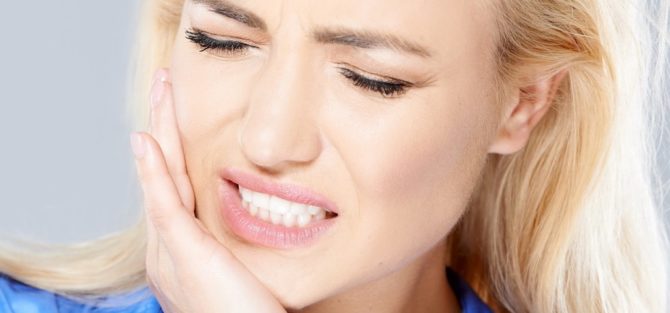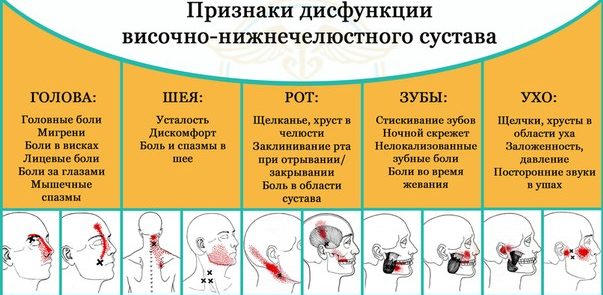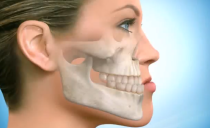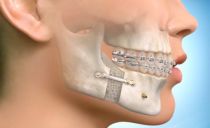Causes of jaw pain when opening the mouth and chewing, what to do
Every day, without noticing it, a person makes many movements with his jaw while talking and eating. Sometimes these movements become palpable and difficult. If the jaw starts to hurt when you open your mouth and when you chew, you can’t make sudden movements and you should immediately consult a doctor - a traumatologist, surgeon or therapist.
Content
The jaw hurts when chewing and opening the mouth: common causes
Pain in the temporomandibular joint can occur under various circumstances. The most common causes of pathology are listed in the table:
| Group of reasons | Possible diagnoses |
|---|---|
| Injuries of the temporomandibular joint - arise as a result of strokes, falls, a sharp opening of the mouth, chewing solid food, careless actions of the dentist. |
Fracture - violation of the integrity of the upper, lower or both jaws at the same time. Dislocation - damage to the joint with displacement of the articular surface of the bones. Bruise - damage to soft tissues without disturbing skeletal components. |
| Purulent-inflammatory processes - occur when an infection enters the bone tissue, sometimes after an injury. |
Phlegmon, abscess - severe purulent inflammation that can destroy a large area of soft and hard tissues. Furuncle - subcutaneous limited suppuration. Osteomyelitis is an inflammation of bone tissue. |
| Tumors - the growth of tissues with uncontrolled cell division. |
Adamantioma - proliferation of jaw tissue. Osteoma is a slowly growing benign tumor. Osteoblatoclastoma is a tumor that may be accompanied by deformity and frequent bone fractures. Sarcoma is a malignant proliferation of bones or cartilage. |
| Diseases of the musculoskeletal system |
Arthritis - damage to the joints with limited movement, often developing against the background of autoimmune diseases. Arthrosis - degenerative changes in the joints with the destruction of cartilage. |
Other causes of jaw pain
In other cases, pain in the jaw on the left or on the right does not appear due to pathological problems in the jaw tissues, but because of inflammation of the structures nearby:
- On the left, on the right or on both sides, the jaw can hurt with otitis media - inflammation of the ear. The more actively the inflammatory process develops, the further the pain spreads. First, it gives to the auricles, then to the cheekbones and jaw. Often the pain syndrome has a shooting character.
- In the upper jaw and cheekbone pain gives with sinusitis - inflammation of the sinus.
- Pain can be triggered by an advanced form of caries when the lesion reaches the pulp chamber and affects the nerve. With some varieties of pulpitis, it is very difficult to determine the source of pain.
Pain on the right or left side of the jaw near the ear can be triggered by a cutting wisdom tooth.
- If after prosthetics a person began to chew painfully, and his jaw began to hurt on one side of the face, the symptom could be due to an irregular shape or incorrect installation of the prosthesis.
- Problems of a neurological nature: neuralgia with pinching of the glossopharyngeal, trigeminal nerve.
- Bruxism is a gnashing of teeth at night.
Associated symptoms
Pain in the jaw with yawning, opening the mouth and chewing is a common symptom for numerous diseases. Finding out why the jaw hurts helps analyzing the accompanying symptoms. The presence / manifestation is taken into account:
- Elevated body temperature.
- Runny nose, sore throat, sinuses, ear.
- Hearing impairment.
- Pain in other joints of the body.
- Weakness, dizziness.
- Joint and bone deformities.
- Ulcers on the skin or in the oral cavity.
- Toothache
- Crunch in the joint when the mouth opens.
- Severe pain: with a fracture, the jaw hurts so badly that the mouth does not open.
- Strengthening pain in the joint when turning the head left or right.
- Enlarged lymph nodes.
With dysfunction of the temporomandibular joint (TMJ), headaches can occur, a person is constantly accompanied by a crack in the jaw.
Diagnostics
If a person has a jaw near his ear and it hurts to open his mouth, he should see a doctor as soon as possible. You should contact your dentist or therapist; if there is an injury, contact a traumatologist or surgeon. If the dentist does not identify the dental causes of the pain, he will refer the patient to the appropriate specialist.
For diagnosis, you may need different examinations:
- X-ray of the jaw.
- MRI
- Examination by an otolaryngologist using special tools.
- Blood analysis.
- Bacterial culture of purulent discharge.
How to treat pain in the jaw joint when opening the mouth
The pain in the jaw does not subside until the underlying disease is cured. If the patient takes pain medication, but does not pass the diagnosis and does not begin treatment under the supervision of a doctor, the symptom will worsen. The direction of treatment depends entirely on the diagnosis and is very different in each case:
- In injuries, a limitation of joint mobility is indicated; sometimes surgical restoration of the integrity of the jaw and jaw joint is required.
- Inflammatory processes in soft and hard tissues, as well as ENT organs, are treated with antibiotics - if it is reliably established that the inflammation is caused by a bacterial infection. Surgical treatment may be necessary to remove accumulated pus.
- In oncological processes in the body, special means are used that control cell division and inhibit tissue growth. Later stages of disease progression are treated with radiation and chemotherapy.
- In case of violation of the structure of bone tissue, vitamins, complex preparations with vitamins and minerals, anti-inflammatory drugs, drugs to normalize cartilage, and a special diet are prescribed. Sometimes the pain medication is injected directly into the joint.
- In case of neuralgia, they make injections for nerve blockade, prescribe sedatives and vitamin preparations, physiotherapeutic procedures, acupuncture.
- Caries, pulpitis and other tooth injuries can be treated by filling or tooth extraction. If the prosthesis caused pain, it must be replaced.
What to do if the jaw near the ear hurts when you open your mouth and when you chew
Without a diagnosis, a person cannot choose the right treatment - that’s why you cannot treat jaw diseases on your own. In addition, some of the above pathologies are useless to treat without hospital conditions.
Although the patient himself is not able to cure such a symptom, sometimes urgent help is required at home, as the pain can be very severe. Following the following recommendations helps reduce discomfort:
- Do not warm the jaw area near the ear: if there is a purulent-inflammatory process, such manipulations will provoke a rapid release of pus and its spread into the bloodstream, which threatens intoxication and general infection. To relieve unpleasant sensations, you can make a cool compress, but only if the pain is not caused by an infection.
- Yawning, chewing, opening your mouth should be very careful.
- So that pain does not intensify, you need to temporarily abandon solid and viscous food, which requires increased chewing load. Do not chew gum.
- If it hurts to open your mouth, conversations need to be reduced to a minimum.
- If the patient has a jaw injury - he cannot open his mouth, yawn, speak - you need to call an ambulance and try to provide maximum peace to the broken joint. Jaw movements and head rotations can cause bone displacement. With open fractures, the skin around the wound is treated with an antiseptic. If there are bone fragments, they must not be touched.
Prevention
Treatment for pain in the jaw near the ear when opening the mouth can be very difficult and lengthy. Therefore, it is better to make sure that such a symptom does not appear in advance. This requires the prevention of diseases in which the jaw, articular structures and tissues located nearby are affected:
- When talking, yawning and nibbling food, one should not open his mouth too wide.
- You can’t get carried away with too hard and viscous food - it can harm not only the teeth, but also the joints.
- Drafts and hypothermia, contacts with infectious-infected people should be avoided.
- A varied diet is needed that provides bone and cartilage tissue with all the beneficial substances.
- After installing the prosthesis on one or both sides, it is necessary to carefully check its compliance with the anatomical shape of the jaw: you need to open and close your mouth, try to close your teeth. If there is discomfort, the prosthesis will have to be adjusted.
- It is necessary to treat diseased teeth in time so that the infection does not penetrate the maxillary or mandibular bone.
- If the jaw suddenly starts to hurt on the left or right side, you should immediately consult a doctor - such a symptom may indicate a dangerous disease that requires urgent treatment.
If your jaw joint hurts when you open your mouth, do not delay the trip to the dentist. It is not recommended to rely on self-medication, since probable diseases with this symptom in a neglected form can be life-threatening.







